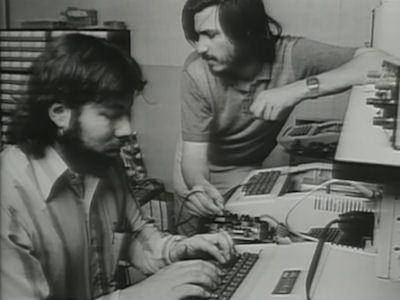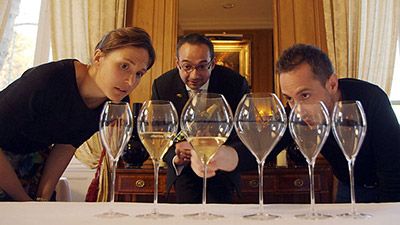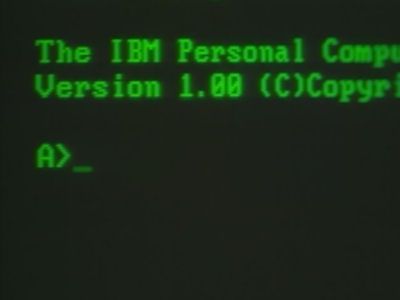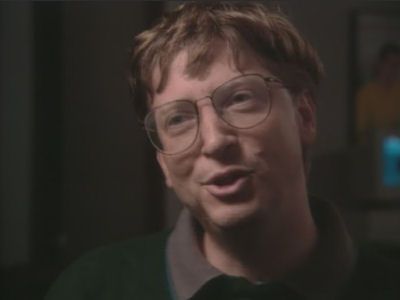The BEST episodes directed by Paul Sen

#1 - Impressing Their Friends
Triumph of the Nerds - Season 1 - Episode 1
Tim Paterson's development of 86-DOS largely from duplicating Gary Kildall's CP/M operating system. Microsoft purchased all rights to 86-DOS from Paterson's employer SCP for US$50,000 shortly before the release of the IBM PC. Microsoft's resulting MS-DOS was an operating system that could run on any 8086-family computer.
Watch Now:Amazon
#2 - POP! The Science of Bubbles
BBC Documentaries - Season 2013 - Episode 64
Physicist Dr Helen Czerski takes us on an amazing journey into the science of bubbles. Bubbles may seem to be just fun toys, but they are also powerful tools that push back the boundaries of science. The soap bubble with its delicate, fragile skin tells us about how nature works on scales as large as solar system and as small as a single wavelength of light. Then there are underwater bubbles, which matter because they are part of the how the planet works. Out at sea, breaking waves generate huge plumes of bubbles which help the oceans breathe. From the way animals behave to the way drinks taste, Dr Czerski shows how bubbles affect our world in all sorts of unexpected ways. Whether it's the future of ship design or innovative new forms of medical treatment, bubbles play a vital role.

#3 - Riding The Bear
Triumph of the Nerds - Season 1 - Episode 2
Compaq's successful reverse-engineering of the IBM PC, which led to many competitors producing IBM-clones that undercut IBM's own offering. While IBM was one of the key companies that fostered the growth of the PC industry and initially dominated it, by 1990 it had lost its lead. IBM's unsuccessful attempt to recapture a dominate share in the PC market with the PS/2 and OS/2, the latter being the successor to MS-DOS. The proprietary nature of the PS/2 and exclusivity of OS/2 was intended to drive sales of IBM's own hardware and made it difficult for other manufacturers of PC compatibles to compete. Microsoft had originally profited from the initial success of the IBM PC. It did even better with the proliferation of clones as IBM's own market share shrunk, so Microsoft saw no business sense in following IBM's lead. Microsoft saw more potential in developing Windows, a project they pursued parallel to their cooperating with IBM on OS/2, and Windows 3.0 proved to be a great success (along with MS-DOS) bundled with new PCs. This led to the split between the two titans, with Microsoft setting the standard for PCs, while IBM concentrated on its mainframe and services businesses.
Watch Now:Amazon
#4 - Great Artists Steal
Triumph of the Nerds - Season 1 - Episode 3
Steve Jobs, having viewed a demonstration of Xerox's Star graphical user interface, developed a desktop manager for the Macintosh with an icon-based interface modeled on the Star. Cringely suggested that Xerox had the potential to be one of the key companies in the up and coming PC industry, had they managed to protect the intellectual property rights of Star GUI. Apple agreed to license parts of the Mac OS GUI to Microsoft who went on to develop Windows. Upon the release of Windows 2.0, Apple sued Microsoft in 1988 over the "look and feel" of the Mac OS. Apple lost the lawsuit in 1994, leaving Microsoft dominant in the operating system business. Steve Jobs had recruited Pepsi-Cola executive John Sculley to become CEO of Apple, saying to the latter "do you want to sell sugar water for the rest of your life or do you want to come with me and change the world?" The Apple Macintosh pioneered many of the features now standard in the PC, particularly ease of use. However, the Macintosh was considerable more expensive, so it was rapidly overtaken by the IBM PC, with some pundits not only saying that IBM had won, but also that Apple could potentially go out of business. Chris Espinosa described Sculley's ouster of Jobs saying "The grandiose plans of what Macintosh were going to be was just so far out of whack with the truth of what the product was doing and the truth of what the product was doing was not horrible it was salvageable but the gap between the two was just so unthinkable that somebody had to do something and that somebody was John Sculley".
Watch Now:Amazon#5 - Plane Crazy, Part 1: The Challenge
PBS Specials - Season 1998 - Episode 5
An ill-fated attempt to build an airplane in 30 days. Cringely is full of enthusiasm, visiting air shows and meeting fellow plane-builders. Others are more realistic. His engineer says, "It's out of my sphere of comprehension." His girlfriend comments, "I home he has good insurance." Plane-builder and journalist Peter Garrison sums it up, "Except that you appear sane... I would just assume that you were a nut." And these people are on his side. Cringely quickly grasps the enormity of the task, "End of day three-I think we're now five days behind schedule."
#6 - Plane Crazy, Part 2: Nightmare On Claremont Street
PBS Specials - Season 1998 - Episode 6
An ill-fated attempt to build an airplane in 30 days. Things progress at a snail's pace. By day 15, Cringely has little to show for his efforts. After 30 days, he has completed about seven percent of his plane. Further, he's done a poor job and the hard part is yet to come. The strain of a heavy work schedule, a limited budget, a host of skeptics and an intrusive film crew becomes too much. Cringely has gone from being a joyful plane enthusiast to a man beset by his demons. He loses it, fights with everyone and winds up verbally, even physically, attacking his film crew.
#7 - Plane Crazy, Part 3: On a Wing and a Prayer
PBS Specials - Season 1998 - Episode 7
An ill-fated attempt to build an airplane in 30 days. Cringely appears renewed. After taking a chainsaw to 46 days of agony and aggravation, he embarks on plane number two. Cringely vows to build his plane and goes home to his native Ohio. There, in Portsmouth, he enlists the help of a family firm of plane-builders and evangelists who don't think he's nuts. In the end, despite the advice and scorn of experts, engine trouble and even floods, Cringely finally completes his plane and flies it, too. His pride restored, he reflects on the lessons learned from such an epic: turn a hobby into work and it just may drive you crazy.